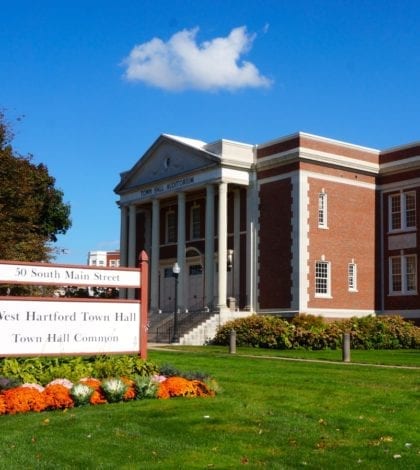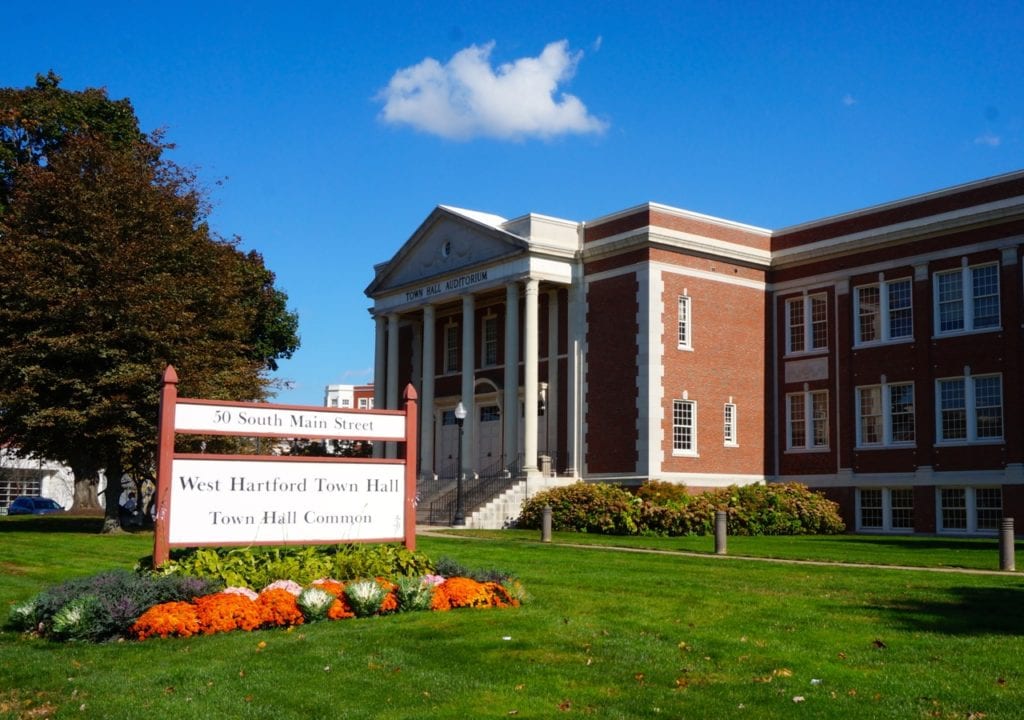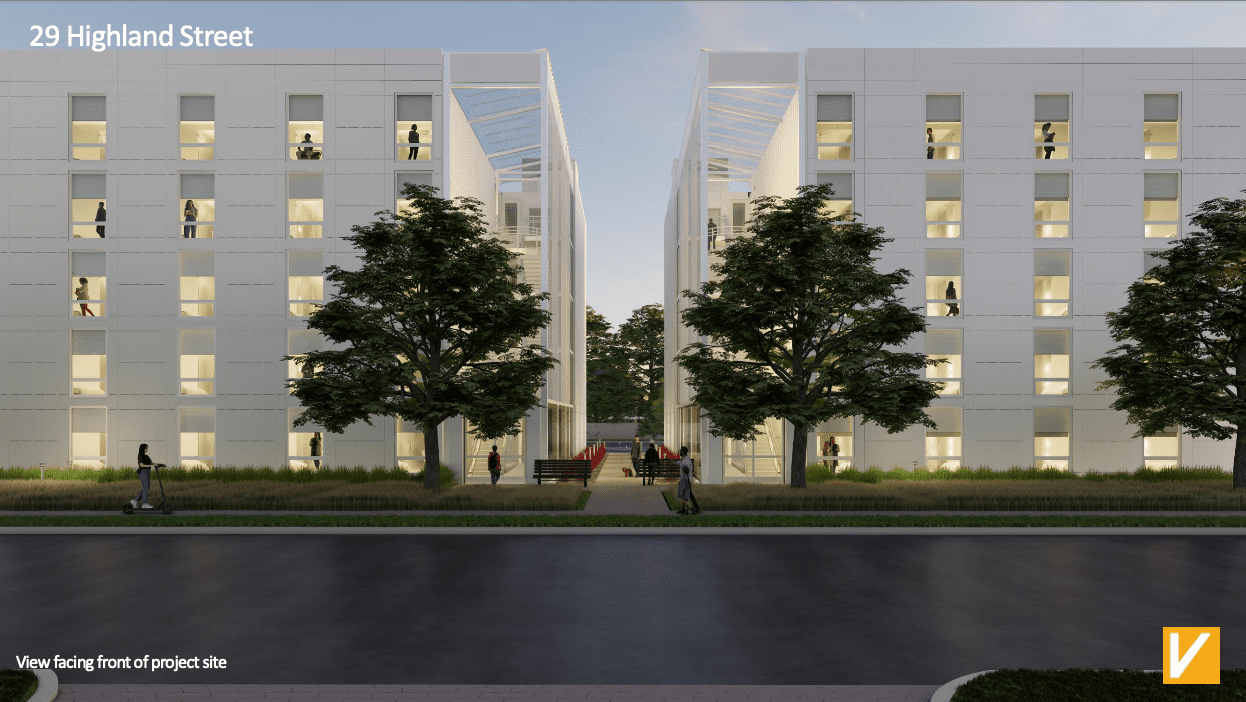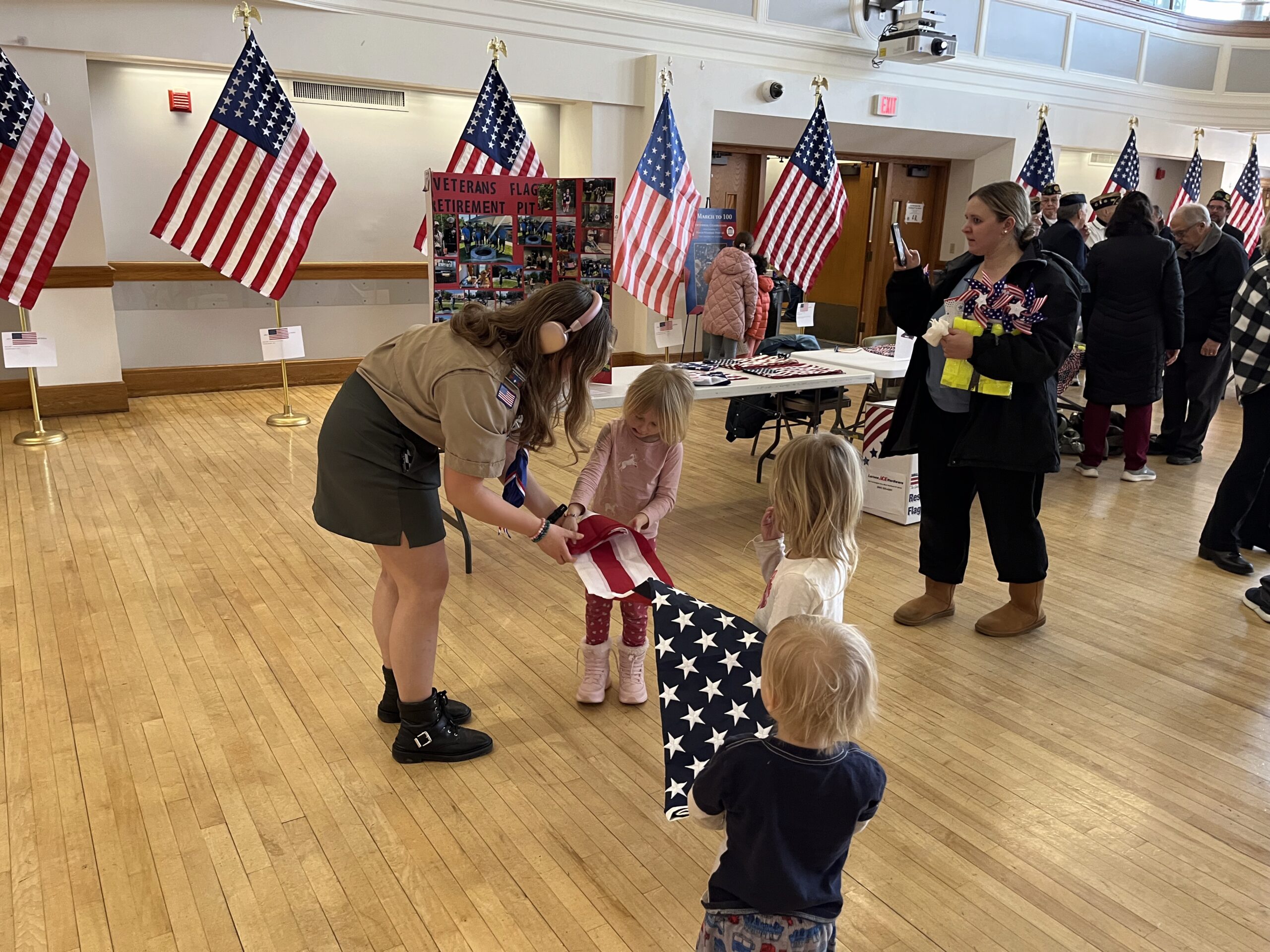West Hartford Town Council Approves Entertainment Ordinance

Audio By Carbonatix

West Hartford Town Hall. Photo credit: Ronni Newton
The ordinance will require businesses that provide entertainment to obtain a license, and gives the town measures to enforce that license.

West Hartford Town Hall. Photo credit: Ronni Newton
By Ronni Newton
The West Hartford Town Council unanimously approved an ordinance Tuesday night which will enhance its control over establishments that provide live or amplified music through the requirement of an entertainment license and by requiring that music be turned off 30 minutes prior to closing.
The ordinance will primarily impact restaurants in or near West Hartford Center, where live music or amplified music played by DJs is often provided on the weekends. It does not apply to activities of non-profits, school or religious services or performances, activities sponsored by the town or held on town-owned property, or background music that is at a low enough volume not to impact conversation.
“This is something we’ve been looking at for several years and has been adopted by many places that have a vivid nightlife,” Town Manager Ron Van Winkle told the Council. He said the intent is to get some control, and to find some balance for the businesses and the residents who live near West Hartford Center.
While West Hartford is proactive in many ways, in other ways the town’s hands are tied. “What we don’t have is a way to be reactive,” Police Chief Tracey Gove said. He said that police have no authority over liquor permits, but this ordinance gives the town some “teeth” in dealing with businesses that repeatedly violate regulations but need that entertainment license to attract customers.
Once an entertainment license is obtained, it is valid until the business changes ownership or the license is revoked. “It’s easy to get, doesn’t cost anything, and if you’re a responsible business owner you would never hear from us,” said Gove.
If there are issues regarding compliance with license requirements, the ordinance spells out a multi-step process that begins with a warning letter for the first offense and a meeting with the police chief to establish an abatement plan after the second offense. Further offenses will lead to a suspension of the entertainment license and fines. After the fifth offense, the entertainment license will be revoked for a minimum of six months.
In addition, the ordinance gives the West Hartford police chief the authority to require a police detail to be deployed on the premises of any business with an entertainment license for the “public safety of the patrons, invitees, employees or the general public” if the chief determines it’s warranted based on incident reports. The licensee will be responsible for paying for that police detail, at the department’s private duty rates, Gove said.
Mayor Shari Cantor called the ordinance “a proactive reactive way to handle this because we will help develop a plan, the police chief will help develop a plan” to ensure that restaurants are operating properly.
The town initially submitted an entertainment ordinance in September, but withdrew it just days later after public outcry about some of its required provisions. That ordinance would have required music to be shut down at 11 p.m., and also would have required a $500 fee for licensing. Live music often doesn’t begin until 10:30 p.m., restaurant owners complained, and although Van Winkle said that the 11 p.m. time was just a placeholder, there were too many other amendments so the ordinance was rewritten and resubmitted.
At a public hearing Tuesday night preceding the Town Council meeting, Van Winkle said that the ordinance “is not an effort to raise money but to provide regulation if we need it … not to ding people or cause problems with restaurants that are successful but to make sure that everyone is safe in our Center.”
Director of Community Services Mark McGovern said that before the revised ordinance was finalized, about 50 establishments were invited to meet. Ten representatives attended that meeting, and he said that “some good and fair requests were made” that were considered in the substituted ordinance.
About 20-25 people attended the public hearing, and six spoke – none of whom were owners of businesses that would be impacted by the entertainment ordinance. Most of the residents who spoke lived just east of the Center and expressed their concern with activities surrounding Los Imperios, which is located at 904 Farmington Ave.
Joan McNulty, who lives in Hampshire House and is vice president of the condominium association, said that for the past four or five years residents in the building are often woken up late at night by loud shouting. “We find bottles of all shapes and sizes all over our front lawn, including people using our bushes for outdoor bathrooms,” she said.
McNulty said that the “overall disturbance and quality of life is becoming frightening and disturbing” and that she and other residents of Hampshire House hope to see it handled by the town.
Farmington Avenue resident Eileen Melody thanked the police for all of the support they have given to the community. “If we could solve the problem rather than respond to the problem that would be better,” she said, voicing support for the ordinance.
Shelagh Smith lives on Arapahoe and said that she is also frequently woken up by people screaming and knocking over trash cans on Thursday, Friday, and Saturday nights. She said she appreciates the town’s effort to provide additional regulation. “I do feel we’re moving forward with something that while is not directly zoning related is a direct impact on quality of life in the Center,” she said.
Van Winkle clarified that the ordinance can address the operation of the restaurant and the sidewalk in front, not mistakes someone may make on the way home. The town has previously passed ordinances, such as restricting open containers, to control other types of behavior.
“The vast majority of our restaurants in the Center do a great job and the vast majority of their customers are respectful,” Van Winkle said. Drunk driving has declined in part due to police enforcement efforts as well as the popularity of using Uber.
“The key point we are trying to do is strike that balance, to have some type of synergy so that quality of life for restaurateurs and for residents is in balance,” Deputy Mayor Leon Davidoff said. There will be issues after implementation,he said, but the ordinance provides steps to follow.
It’s really about quality of life issues for people around the Center, Council member Chris Barnes said. “If businesses in town are practicing bad behavior, this ordinance gives us another tool to address that and that’s a good thing – a step in the right direction.”
Business owners have 30 days to apply for a license. Operating without an entertainment license will be result in fines of $250 per day, according to the ordinance.
Like what you see here? Click here to subscribe to We-Ha’s newsletter so you’ll always be in the know about what’s happening in West Hartford!



